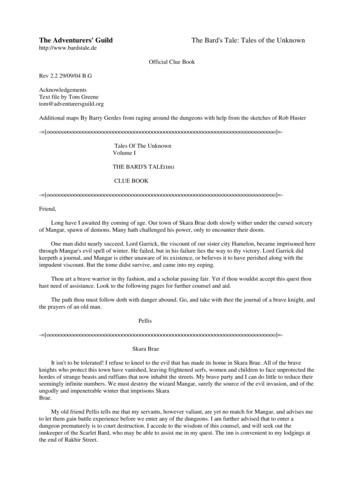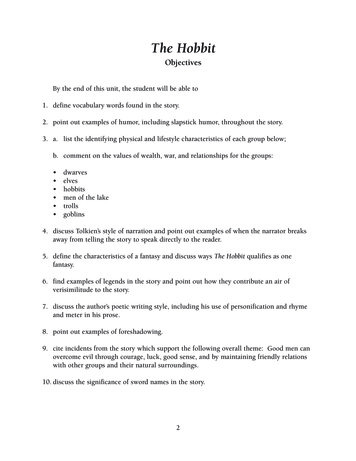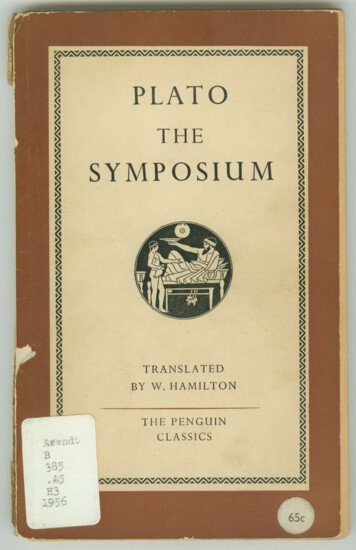
Transcription
fl.J.
THE GNOSTIC RELIGIONThe Message of the Alien God and theBeginnings of Christianityby Hans JonasBeacon PressBeacon HillBoston
@ 1958 by Hans Jonu. Library of C.Ongress catalog card number: 58-6246. Printedin the United Statct of AmericaContentsPr4ace1. Introduction: East and W est in H ellenism(a) The Part of the WestGreek Culture on the Eve of Alexander's C.OnqucstaC.Osmopolitaniam and the New Greek C.OlonizationThe Hellenization of the EastLater Hellenism: The Change from Secular to Religious CultureThe Four Stages of Greek Culture(b) The Part of the EastThe East on the EvC' of Alcunder's C.OnqucstaThe East Under HellenismThe Rc- mergcncc of the Eastxiii3456791011131723Part I. Gnostic Literature--Main Tenets, Symbolic Language2.92. The Meaning of Gnosis and the Extent of the 43Spiritual Climate of the EraThe Name "Gnosticism"The Origin of GnosticismThe Nature of Gnostic "Knowledge"Survey of SourCCISecondary or Indirect SourcesPrimary or Direct SourCC1(f) Abstract of Main Gnostic rality3. Gnostic Imagery and Symbolic Language(a) The "Alien"(b) "Beyond," "Without," "Thia World," and "The Other World"(c) Worlds and Aeons.,BARO COllEGE lfBRARTAN NAN DAll-Ofll-H UDSON,44444648495151
CONTENTSviThe Cosmic Habitation and the Stranger' Sojourn"Light" and "DarknCISt. Life. and "Death""Mixture," "Dispenal,'' the "One," and the "Many""Fall," "Sinking," "Capture"Forlornness, Dread, HomcsickncuNumbness, Sleep, Intoxication(j) The Noise of the World(k) The "Call from Without"(1) The "Alien Man"(m) The Content of the Call(n) The Response to the Call(o) Gnostic AllegoryEve and the SerpentCain and the CreatorPrometheus and ZeusAppendix to Chapter 3: Glossary of Mandacan Tcrma(d)(e)(f)(g)(h)(i)Part II. G nostic Systems of ThoughtCONTENTS55585762656873747580869192949697I OI4. Simon Magus1035. The "Hymn of the Pearl"112(a) The Text(b) CommentarySerpent, Sea, EgyptThe Impure GarmentThe LetterThe Conquering of the Serpent and the AscentThe Heavenly Garment; the ImageThe Transcendental SelfThe Pearl1131161161181191201221231256. The Angels That Made the World. The Gospel of Mar130cion(a) The Angds That Made the World(b) The Gospel of MarcionMarcion's Unique Position in Gnostic ThoughtRedemption Ac.cording to MarcionThe Two Gods"Grace Freely Given"Marcion's .AJcctic MoralityMarcion and Scripture132137137139141143144HS7. The Poimandres of Hermes Trismegistus(a) The Text(b) CommentaryThe Origin of the Divine ManThe Descent of Man; the Planetary SoulThe Union of Man with Nature; the Narcissus MotifThe Ascent of the SoulThe Fust Beginnings8. The Valentinian Speculation(a) The Speculative Principle of Valcntinianism(b) The SystemDcvdop1I1cnt of the PleromaThe Crisis in the PleromaConacqucnccs of the Crisis. Function of the LimitRestoration of the PleromaEvents Outside the PleromaSufferings of the Lower SophiaOrigination of MatterDerivation of the Single ElementsDcmiurgc and Creation of the WorldSalvationAppendix I to Chapter 8: The Position of Fire Among the ElementsA?pendix II to Chapter 8: The System of the Apocryphon of 841851871881891901941971999. Creation, W orld History, and Salvation According to Mani 206(a) Mani's Method; His Vocation(b) The SystemThe Primal PrinciplesThe Attack of the DarknessThe Pacifism of the World of LightThe First Creation: Primal ManThe Defeat of Primal ManThe Sacrifice and Adulteration of the SoulThe Second Creation: The Living Spirit; Liberation of Primal ManCreation of the MacrocosmosThe Third Creation: The McucngcrOrigin of Plants and AnimalsCreation of Adam and EveMission of the Luminous Jesus; the Jesus PatibilisPractical Conclusions; Mani's Ascetic MoralityThe Doctrine of the Last Things(c) Recapitulation: Two Types of -Dualism in Gnostic 228231233236
viiiCONTENTSPart Ill Gnosti cism and the Classical Mind10. The Cosmos in Greek and Gnostic Evaluation2. 39241(a) The Idea of "Cosmos" and Man" Place in ItThe Greek PositionCosmos-Piety as a Position of RetreatThe Gnostic RevaluationThe Greek Reaction(b) Destiny and the StarsForms of Sidereal Piety in the Ancient WorldThe Gnostic RevaluationThe Greek Reaction; the Brotherhood of Man and StarsThe Acoamic Brotherhood of Salvation24124124725025325425526026226411. Virtue and the Soul in Greek and Gnostic Teaching2Ci6(a) The Ideal of Virtue: It"s Absence in Gnosticism(b) Gnostic MoralityNihilism and LibertinismAsceticism, Sdf-Abnegation, the New "Virtue"Arete and the Christian "Virtues.Virtue in Philo Judaeua(c) Gnostic PsychologyThe Demonological Interpretation of InwardnessThe Soul as FemaleEcstatic Illumination(d) Conclusion: The Unknown God266270270274277278281281283284288Corrections and The publishers thank the following for giving permission to· quote or translate from the works mentioned:Clarendon Press: The Republic of Plato, trans. F.M. Cornford;W. Kohlhammer: A. Manichaean Psalm-book, ed. and trans. C.R.C.Allbcrry, and Kephalaia, ed. and trans. H. J. Polotsky and A.Bohlig; Oxford University Press: The Dialogues of Plato, trans. B.Jowett, and The Student's Oxford Aristotle, ed. W. D. Ross; Rascher& Cie., and the C. G. Jung-Institut: Evangelium Veritatis, ed. andtrans. M. Malinine, H. C. Puech, G. Quispel; Routledge & KeganPaul, Ltd.: Plato's Cosmology, F. M. Cornford; University Press,Cambridge: Origen: Contra Ce/sum, trans. H. Chadwick; Akademie-Verlag, Berlin: Die gnostischen Schriften des koptischenPapyrus Berolinensis 8502, ed. and trans. W. Till.Special acknowledgment is made to the generosity shown byW. Kohlhammer, Stuttgart, and by Rascher & Cie., Ziirich, in permitting extensive quotation from the Manichaean Psalm-book andthe Evangelium V eritatis respectively, either of them editio princeps of most important new texts in the field.
PREFACExvgnostic sects, Epiphanius of Salamis, wrote in the fourth centuryA.D. From then on, with the danger past and the polemical interestno longer alive, oblivion settled down on the whole subject, untilthe historical interest of the nineteenth century returned to it in thespirit of dispassionate inquiry. By reason of subject matter it stillfell into the domain of the theologian, like everything connectedwith the beginnings of Christianity. But the Protestant theologians(mostly German) who engaged in the new investigationproached their task as historians who arc no longer party to theconflict, though intellectual trends of their own time might swaytheir sympathies and j udgmcnts.It was then that diverse schools of thought about the historicalnature of Gnosticism began to spring up. Naturally enough, theHellenic, and more particularly "Platonic," thesis of the ChurchFathers was revived, and not merdy on their authority, for suggestive aspects of the literary evidence, including gnostic use of philosophical terms, as well as the general probabilities of the age,almost inevitably at first point in that direction. Indeed there hardlyseemed to be a choice of alternatives as long as only JudacoChristian and Greek thought were reckoned with as the forceswhich could exert influence in that period. But somehow the division of the quantity that is Gnosticism by these known factors leavestoo large a remainder, and from the early nineteenth century the"Hellenic" school was confron d by an "oriental" one which arguedthat Gnosticism derived from an older "oriental philosophy."Though this position reflected a correct instinct, it suffered from theweakness that it operated with an ill-defined and really unknownmagnitude-that oriental philosophy the nature and previous existence of which were inferred from the facts of Gnosticism itselfrather than independently established. The position gained firmer Iground, however, once the mythological rather than the philosophical character of what was felt to be oriental in Gnosticism wasrecognized and the search for the mysterious philosophy abandoned.It is generally true to say that to this day the "Greek" and"oriental" emphases shift back and forth according to whether thephilosophical or the mythological, the rational or the irrational facetof the phenomenon is seen as decisive. The culmination of theGreek and rational thesis may be found at the end of the centuryap-
xviPREFACEin Adolf von Harnack's famous formula that Gnosticism is "theacute Hellenization of Christianity."Meanwhile, however, the scientific scene changed with the classical scholar and the oricntalist entering the field where before thetheologian had been alone. The investigation of Gnosticism became part of the comprehensive study of the whole age of laterAntiquity in which a variety of disciplines joined hands. Herc itwas the younger science of the orientalists which could add most towhat theology and classical philology had to offer. The vague concept of generally "oriental" thought gave way to a concrete knowledge of the several national traditions mingling in the culture of thetime; and the concept of Hellenism itself was modified by the inclusion of these distinct heterogeneous in6uenccs in its hitherto predominantly Greek picture. As to Gnosticism in particular, theacquaintance with such massively mythological material as theCoptic and Mandaean texts dealt a blow to the "Greek-philosophical" position from which it never ully recovered, though in thenature of the case it can never be entirely abandoned either. Diagnosis became largely a matter of genealogy, and for this the fieldwas thrown wide open: one by one, or in varying combinations, thedifferent oriental filiations suggested by the rainbow colors of thematerial-Babylonian, Egyptian, Iranian-were elaborated to determine the principal "whence" and "what" of Gnosis, with the overallresult that its picture became more and more syncretistic. Thelatest turn in the quest for one dominant line of descent is to deriveGnosticism from Judaism: a needful correction of a previous neglect, but in the end probably no more adequate to the total andintegral phenomenon than other partial and partially true explanations. Indeed, so far as traceable pedigrees of elements go, all investigations of detail over the last half century have proved divergentrather than convergent, and leave us with a portrait of Gnosticismin which the absence of a unifying character seems to be the salientfeature. But these same investigations have also gradually enlargedthe range of the phenomenon beyond the group of Christian heresies originally comprised by the name, and in this greater breadth,as well as in the greater complexity, Gnosticism became increasingly revealing of the whole civilization in which it arose andwhose all-pervading feature was syncrctism.
INTRODUCTION: EAST AND WEST IN HELLENISMhad envisioned and which Hellenism had made possible, althoughthe Persian renascence beyond the Euphrates had diminished itsgeographical scope. The paralld division of Christendom into aLatin and a Greek Church reflects and perpetuates the same culturalsituation in the realm of religious dogma.It is this spatio-cultural unity, created by Alexander and existingin turn as the kingdoms of the Diadochi, as the eastern provincesof Rome, as the Byzantine Empire, and concurrently as the GreekChurch, a unity bound together in the Hellenistic-oriental synthesis,which provides the setting for those spiritual movements withwhich this book is concerned. In this introductory chapter we haveto fill in their background by saying something more about Hellenism in general and by clarifying on the one hand some aspects ofits two components, namdy, Hellas and Asia, and on the other themanner of their meeting, marriage, and common issue.(a) THE PART OF THE WESTWhat were the historical conditions and circumstances of thedevelopment we have indicated? The union which Alexander'sconquest initiated was prepared for on both sides. East and Westhad each progressed previously to the maximum degree of unification in its own realm, most obviously so in political terms: the Easthad been unified under Persian rule, the Greek world under theMacedonian hegemony. Thus the conquest of the Persian monarchyby the Macedonian was an event involving the whole "West" andthe whole "East."No less had cultural developments prepared each side, thoughin a very different manner, for the roles they were destined to playin the new combination. Cultures can best mix when the thoughtof each has become sufficiently emancipated from particular local,social, and national conditions to assume some degree of generalvalidity and thereby become transmissible and exchangeable. It isthen no longer bound to such specific historical facts as the Athenian polis or the oriental caste society but has passed into the freerform of abstract principles that can claim to apply to all mankind,that can be learned, be supported by argument, and compete withothers in the sphere of rational discussion.INTRODUCTION: EAST AND WEST IN HELLENISM5Greek Culture on the Eve of Alexander's ConquestsWhen Alexander appeared, Hellas had, both in point of factand in its own consciousness, reached this stage of cosmopolitanmaturity, and this was the positive precondition of his success,which was matched by a negative one on the oriental side. Formore than a century the whole evolution of Greek culture had beenleading in this direction. The ideals of a Pindar could hardly havebeen grafted onto the court of a Nebuchadnezzar or an Artaxerxesand the bureaucracies of their realms. Since Herodotus, "the fatherof history" (fifth century B.c.), Greek curiosity had interested itselfin the customs and opinions of the "barbarians"; but the Hellenicway was conceived for and suited to Hellenes alone, and of themonly those who were .freeborn and full citizens. Moral and pclitical Jideals, and even the idea of knowledge, were bound up with verydefinite social conditions and did not claim to apply to men in general-indeed, the concept of "man in general" had for practicalpurposes not yet come into its own. However, philosophical reflection and the development of urban civilization in the century preceding Alexander led gradually to its emergence and explicit formulation. The sophistic enlightenment of the fifth century had set theindividual over against the state and its norms and in conceiving theopposition of nature and law had divested the latter, as resting onconvention alone, of its ancient sanctity: moral and political normsare relative. Against their skeptical challenge, the Socratic-Platonicanswer appealed, not indeed to tradition, but to conceptual knowledge of the intelligible, i.e., to rational theory; and rationalismcarries in itself the germ of universalism. The Cynics preached arevaluation of existing norms of conduct, self-sufficiency of the private individual, indifference to the traditional values of society, suchas patriotism, and freedom from all prejudice. The internal declineof the old city-states together with the loss of their external independence weakened the particularistic aspect of their culture whileit strengthened the consciousness of what in it was of general spiritual validity.In short, at the time of Alexander the Hellenic idea of culturehad evolved to a point where it was possible to say that one was aHellene not by birth but by education, so that one born a barbarian
67INTRODUCTION! EAST AND WEST IN HELLENISMINTRODUCTION! EAST AND WEST IN HELLENISMcould become a true Hellene. The enthroning of reason as thehighest part in man had led to the discovery of man as such, andat the same time to the conception of the Hellenic way as a generalhumanistic culture. The last step on this road was taken when theStoics later advanced the proposition that freedom, that highestgood of Hellenic ethics, is a purely inner quality not dependent onexternal conditions, so that true freedom may well be found in aslave if only he is wise. So much docs all that is Greek become amatter of mental attitude and quality that participation in it is opento every rational subject, i.e., to every man. Prevailing theory placedman no longer primarily in the context of the polis, as did Plato andstill Aristotle, but in that of the cosmos, which we sometimes findcalled "the true and great polis for all." To be a good citizen of thecosmos, a cosmopolites, is the moral end of man; and his title to thiscitizenship is his possession of logos, or reason, and nothing elsethat is, the principle that distinguishes him as man and puts himinto immediate relationship to the same principle governing theuniverse. The full growth of this cosmopolitan ideology wasreached under the Roman Empire; but in all essential features theuniversalistic stage of Greek thought was present by Alexander'stime. This turn of the collective mind inspired his venture and wasitself powcrfully reinforced by his success.longer clung to geographic continuity with the mother country, andgenerally with what had hitherto been the Greek world, but spreadfar into the continental expanses of the Hellenistic Empire. Unlikethe earlier colonies, the cities thus founded were not daughter citiesof individual mctropolcs but were fed from the reservoir of thecosmopolitan Greek nation. Their main relations were not to oneanother and to the distant mother city but each acted as a center ofcrystallization in its own environment, that is, in relation to itsindigenous neighbors. Above all, these cities were no longer sovereign states but parts of centrally administered kingdoms. Thischanged the relation of the inhabitants to the political whole. Theclassical city-state engaged the citizen in its concerns, and these hecould identify with his own, as through the laws of his city he governed himself. The large Hellenistic monarchies neither called fornor permitted such close personal identification; and just as theymade no moral demands on their subjects, so the individual detached himself in regard to them and as a private person (a statushardly admitted in the Hellenic world before) found satisfaction ofhis social needs in voluntarily organized associations based on community of ideas, religion, and occupation.The nuclei of the newly founded cities were as a rule constituted by Greek nationals; but from the outset the inclusion of compact native populations was part of the plan and of the charter bywhich each city came into being. In many cases such groups ofnatives were thus transformed into city populations for the firsttime, and into the populations of cities organized and self-administering in the Greek manner. How thoroughly Alexander himselfunderstood his policy of fusion in racial terms as well is shown bythe famous marriage celebration at Susa when in compliance withhis wishes ten thousand of his Macedonian officers and men tookPersian wives.Cosmopolitanism and the New Greek ColonizationSuch was the inner breadth of the spirit which Alexander carriedinto the outward expanses of the world. From now on, Hellas waseverywhere that urban life with its institutions and organizationflourished after the Greek pattern. Into this life the native populations could enter with equal rights by way of cultural and linguisticassimilation. This marks an important difference from the olderGreek colonization of the Mediterranean coastline, which established purely Greek colonies on the fringes of the great "barbarian"hinterland and envisaged no amalgamation of colonists and natives.The colonization following in the footsteps of Alexander intendedfrom the outset, and indeed as part of his own political program, asymbiosis of an entirely new kind, one which though most obviously a Hellenization of the East required for its success a certainreciprocity. In the new geopolitical area the Greek clement noThe Hellenization of the EastThe assimilating power of such an entity as the Hellenistic citymust have been overwhelming. Participating in its institutions andways of life, the non-Hellenic citizens underwent rapid Hellenization, shown most plainly in their adoption of the Greek language:and this in spite of the fact that probably from the beginning the
INTRODUCTION: EAST AND WEST IN HELLENISM9still going on at a time when movements of renascence of nationallanguages and literatures were already under way. The earliest,indeed anachronistic, example of such a situation is provided by thefamiliar events of the Maccabaean period in Palestine in the secondcentury B.c. Even as late as the third century A.D., after five hundredyears of Hellenistic civilization, we observe a native of the ancientcity of Tyre, Maleh us son of Malehus, becoming a prominent Greekphilosophic writer and at the instance of his Hellenic friends changing (or suffering them to change) his Semitic name first to theGreek Basileus,1 then to Porphyrius,2 thereby symbolically declaringhis adherence to the Hellenic cause together with his Phoenicianextraction. The interesting point in this case is that at the sametime the counter-movement was gathering momentum in his nativecountry-the creation of a Syrian vernacular literature associatedwith the names of Bardesanes, Mani, and Ephracm. This movement and its parallels everywhere were part of the rise of the newpopular religions against which Hellenism was forced to defenditself.Later Hellenism: The Change from Secularto Religious CultureWith the situation just indicated the concept of Hellenismunderwent a significant change. In late antiquity the unchallengeduniversalism of the first Hellenistic centuries was succeeded by anage of new differentiation, based primarily on spiritual issues andonly secondarily also of a national, regional, and linguistic character.The common secular culture was increasingly affected by a mentalpolarization in religious terms, leading finally to a breaking up ofthe former unity into exclusive camps. Under these new circumstances, "Hellenic," used as a watchword within a world alreadythoroughly Hellenized, distinguishes an embattled cause from itsChristian or gnostic opponents, who yet, in language and literaryform, are themselves no less part of the Greek milieu. On thiscommon ground '.Hellenism became almost equivalent to conservatism and crystallized into a definable doctrine in which the whole1''King"--the literal translation of Malchus.''The purple-clad"--an allusion to his original name as well as to themajor industry of his native city, purple-dyeing.1
10INTRODUCTION: EAST AND WEST IN HELLENISMtradition of pagan antiquity, religious as well as philosophical, wasfor the last time systematized. Its adherents as well as its opponentslived everywhere, so that the battlefield extended over the wholecivilized world. But the rising tide of religion had engulfed "Greek"thought itself and transformed its own character: Hellenistic secularculture changed into a pronouncedly religious pagan culture, bothin self-defense against Christianity and from an inner necessity.This means that in the age of the rising world-religion, Hellenismitself became a denominational creed. This is how Plotinus andstill more Julian the Apostate conceived their Hellenic, i.e., pagan,cause, which in Neoplatonism founded a kind of church with itsown dogma and apologetic. Doomed Hellenism had come to be aparticular cause on its own native ground. In this hour of itstwilight the concept of Hellenism was at the same time broadenedand narrowed. It was broadened in so far as, in the final entrenchment, even purely oriental creations like the religions of Mithras orof Attis were counted in with the Hellenistic tradition that was tobe defended; it was narrowed in that the whole cause became aparty cause, and more and more that of a minority party. Yet, aswe have said, the whole struggle was enacted within a Greek framework, that is, within the frame of the one universal Hellenic cultureand language. So much is this the case that the victor and heir inthis struggle, the Christian Church of the East, was to be predominantly a Greek church: the work of Alexander the Great triumphed even in this defeat of the classical spirit.The Four Stages of Greek CultureWe can accordingly distinguish four historical phases of Greekculture: (1) before Alexander, the classical phase as a nationalculture; (2) after Alexander, Hellenism as a cosmopolitan secularculture; (3) later Hellenism as a pagan religious culture; and (4)Byzantinism as a Greek Christian culture. The transition from thefirst to the second phase is for the most part to be explained as anautonomous Greek development. In the second phase (300 B.c.fust century 1.c.) the Greek spirit was represented by the great rivalschools of philosophy, the Academy, the Epicureans, and above allthe Stoics, while at the same time the Greek-oriental synthesis wasINTRODUCTION: EAST AND WEST IN HELLENISM11progressing. The transition from this to the third phase, the turn-1ing to religion of ancient civilization as a whole and of the Greekmind with it, was the work of profoundly un-Greek forces which,originating in the East, entered history as new factors. Betweenthe rule of Hellenistic secular culture and the final defensive position of a late Hellenism turned religious lie three centuries of revolutionary spiritual movements which effected this transformation,among which the gnostic movement occupies a prominent place.With these we have to deal later.(b) THE PART OF THE EASTSo far we have considered the role of the Greek side in thecombination of West and East, and in doing so started from theinternal preconditions that enabled Hellenic culture to become aworld civilization following upon Alexander's conquests. Thesepreconditions had of course to be matched by preconditions on theoriental side which explain the role of the East in the combination-its apparent or real passivity, docility, and readiness for assimilation. Military and political subjection alone is not sufficient to explain the course of events, as the comparison with other conquestsof areas of high culture shows throughout history, where oftenenough the victor culturally succumbs to the vanquished. We mayeven raise the question whether in a deeper sense, or at least partially, something of the kind did not also happen in the case ofHellenism; but what is certainly manifest at first is the unequivocalascendancy of the Greek side, and this determined at least the formof all future cultural expression. What, then, was the condition ofthe oriental world on the eve of Alexander's conquest to explain itssuccumbing to the expansion of Greek culture? And in what shapedid native oriental forces survive and express themselves under thenew conditions of Hellenism? For naturally this great East with itsancient and proud civilizations was not simply so much dead matterfor the Greek form. Both questions, that concerning the antecedentconditions and that concerning the manner of survival, are incomparably harder to answer for the oriental side than the parallel oneswere for the Greek side. The reasons for this are as follows.
12INTRODUCTION: EAST AND WEST IN HELLENISMIn the first place, for the time before Alexander, in contrastwith the wealth of Greek sources we arc faced with an utter paucityof oriental ones, except for the Jewish literature. Yct this negativefact, if we may take it as a sign of literary sterility, is itself a historical testimony which confirms what we can infer from Greek sourcesabout the contemporary state of the Eastern nations.Moreover, this vast East, unified in the Persian Empire by sheerforce, was far from being a cultural unity like the Greek world.Hellas was the same everywhere; the East, different from region toregion. Thus an answer to the question regarding cultural preconditions would have to fall into as many parts as there were culturalentities involved. This fact also complicates the problem of Hellenism itself as regards its oriental component. Indeed, Gustav Droysen, the originator of the term "Hellenism" for the post-AlexandrianGreek-oriental synthesis, has himself qualified the term by statingthat in effect as many different kinds of Hellenism evolved as therewere different national individualities concerned. In many cases,however, these local factors are little known to us in their originalform. Nevertheless, the overall homogeneity of the ensuing Hellenistic development suggests some overall similarity of conditions. Infact, if we except Egypt, we can discern in the pre-HellenisticOrient certain universalistic tendencies, beginnings of a spiritualsyncrctism, which may be taken as a counterpart to the cosmopolitan turn of the Greek mind. Of this we shall have more to say.Finally, in the period after Alexander the supremacy of panHellenic civilization meant precisely that the East itself, if it aspiredto literary expression at all, had to express itself in the Greek language and manner. Consequently the recognition of such instancesof self-expression as voices of the East within the totality of Hellenistic literature is for us frequently a matter of subtle and not unequivocally demonstrable distinction: that is to say, the situationcreated by Hellenism is itself an ambiguous one. With the interesting methodological problem this presents we shall have to deallater.These are some of the difficulties encountered in any attemptto clarify the picture of the Eastern half of the dual fact which wecall Hellenism. We can nonetheless obtain a general though partly
14INTRODUCTION: EAST AND WEST IN HELLENISMas petrifaction could also be regarded as. a mar.k of c perfectionwhich a system of life has attained-this consideration may well.apply in the case of Egypt.In addition, the Assyrian and Babylonian practice of expatriating and transplanting whole conquered peoples, or more accurately their socially and culturally leading strat , had d stroycd thefor
Part I. Gnostic Literature--Main Tenets, Sym-bolic Language 2.9 2. The Meaning of Gnosis and the Extent of the Gnostic Movement 31 (a) Spiritual Climate of the Era 31 (b) The Name "Gnosticism" 32 (c) The Origin of Gnosticism 33 (d) The Nature of Gnostic "Knowledge" 34











